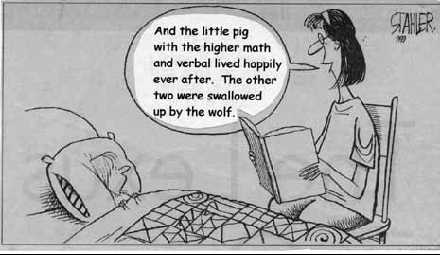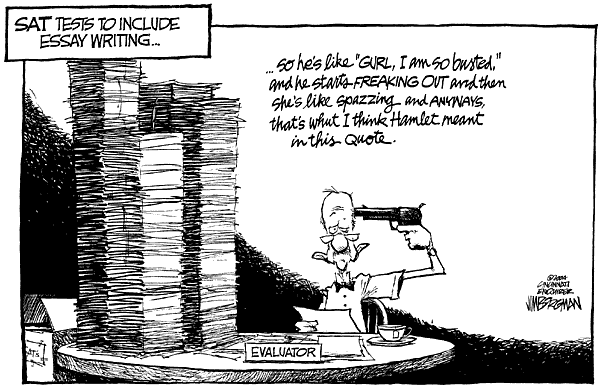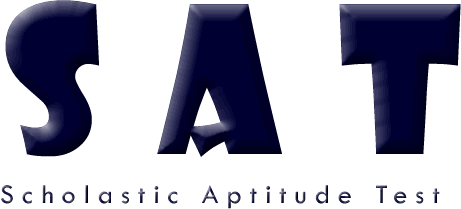
Does this sound like you?
"Help! I have to take the SAT and score well enough to get into the college of my choice but it's hard and boring and I don't want to study for it!"
If so, you've come to the right place. Here is what you do:
1. Get over
the studying thing. Yes, the SAT is hard and boring which
means that the studying will be hard and boring but it doesn't have to
be as hard and boring as you think.
2. Buy this book -
Up Your Score
It is the best SAT book on the market. It has the best tips and tricks
plus it is written in a way to make it easy to read, nay, FUN to read
(yes, even for those of you who hate to read). As with any SAT book, make
sure you have the up to date version.
Here is their web site: www.upyourscore.com
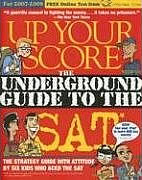
3.
For practice, you should try this website:
College
Board SAT Online Course
You will need to sign in and to do so, you will need Northern's school
code:
341080
They not only have practice, but it will tell you what you got wrong and why it is wrong as well as tell you why a right answer is correct. It is good, immediate feedback.

4.
If you want more practice, or jsut like to practice filling
in those bubbles, this is the only book you need to get. It will cost
you, but it is worth it. The book is titled:
The Official SAT Study Guide for the New SAT
It has tips and help, but you won't want to read them because it is as dry as any SAT book you can get. It does, however, have SAT questions from the makers of the real SAT.
Do not waste your time with any
other practice questions unless you get them from one of these two places!
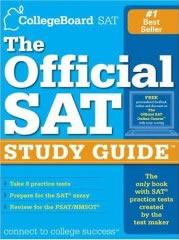
Some Basic Information
Take the SAT as often as possible!
Why? Because the SAT gives you a final score, but that score is based on three individual scores. The three parts of the SAT are WRITING, READING, and MATH. The lowest you can make on each is a 200. The highest is an 800. Therefore, a bad SAT score is a 600 and a good is a 2400.
Writing
250
Reading
300
Math
250
300
250
300
What is your total score? If you went to Riverside High School, you would probably say 850 because 300 + 250 + 300 = 850. This would be amazing for a Riverside student to actually be able to do since those scores do indeed add up to be 850. However, the SAT does not work that way. Your total is really 900. How? Because you scored 300 on the Writing, 300 on the Reading, and 300 on the Math. The reason you scored 300 on the reading is that the SAT takes your HIGHEST scores of each section. See how that works? It cannot hurt you to take the SAT more than once.
In fact, ideally you would plan on taking the SAT once your sophomore year and twice your junior year. That way, if you need it, you have one more chance your senior year to take it.
If you are a senior and are re-taking the test one last time to get your score up as high as possible, then use this information to your advantage. You cannot lose a good score that you already have. So you should pick the section you think you have the best chance at of improving and study for that section as hard as you can.
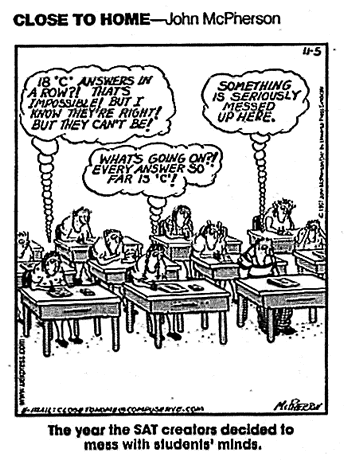
*The SAT will allow the same answer choice to appear
three times in a row (but not often). If you find the same answer popping
up 4 or more times in a row, one of them, at least, is wrong. *
SAT vs. ACT: How do the Tests Compare?
(the following comes from http://www.princetonreview.com/college/testprep/testprep.asp?TPRPAGE=141)
What is the difference between the SAT and ACT? They’re both
standardized tests and they both factor into the college admissions
process. To learn about the differences between the two tests and how
they compare, take a look at the chart below.
So what is a good score?
That largely depends on your university. The average score on the SAT is 1500 (which means the average for each section is 500). What college you go to will depend on what score you need to make. Here is the range for a few colleges around here (this usually means that the middle 50% scores in this range, with 25% being below and 25% being above):
Average Scores -
DUKE: 2060 - 2330
STATE: 1610 - 1850
UNC-Charolette: 1480-1730
UNC: 1220 - 1390*
UNCW: 1160 - 1230***
UNCA: 1060-1250*
Appalachian State: 1130*
ECU: 1050 - 1120** - (1580
- 1680)
UNCG:
1050** - (1580)
Western Carolina:
1020*
NCCU: 780-930*
* This score appears to not take into account the Writing. This may be because they do not take it into account or it may be that they are not yet counting it as a part of their average score.
** This score does not take into account the Writing, however, these schools do use the Writing as a part of their admission process. The score in parenthesis is a projected score needed (made up by me).
*** These schools do not take the Writing test into consideration as of 2007.
This being said, it is important to remember that the SAT is only one part of the total admissions process. The admissions board looks at everything from your scores to your GPA to extra activities.
Should I Guess on the SAT?
Thanks to Up Your Score for this one:
YES.
I know a lot of people tell you differently. However, they are wrong and I am right.
Here is why:
For every question you get right, that is one point. For every question
you get wrong, you lose 1/4 point. For every question you leave blank,
you get no points.
Stay with me here - I know it looks like you should go for the no points over the risk of getting it wrong and losing 1/4 point.
Let's say that there are 100 questions on the SAT (to pick a nice round even number). If you do not open you test book and just answer the questions completely at random, you have a 20% chance of getting each answer correct (for those Duke fans out there - there are 5 answer choices, so you have a 1 in 5 chance to get it right - that equals 20%).
So, 20% of 100 is 20. You got 20 correct answers and 80 incorrect. Each one of those 80 is minus 1/4. One fourth of 80 is 20 so you would take your number correct (20) and subtract your number incorrect (20) and you come out with --- 0! You lost and gained nothing.
Now, that is without even looking at your test booklet. Hopefully if you paid your money and gave up your Saturday to take this test, you would open you book and attempt answer the questions. Every time you can eliminate one answer choice, you increase your chances to get the answer right. Let's say you guess, but you can use your brains to eliminate one answer choice. Now you have a 25% chance (one in four) to get it right. That would be 25 answers correct (25 points) and 75 answers wrong (75 x 1/4 = around 19). Now just by guess you would have gotten an additional 6 points added to your raw score. In many cases you eliminate two or more answers.
In short - guessing with no knowledge doesn't hurt. Guessing with some knowledge helps. It is better to guess.
SAT |
``` | ACT |
||
| When is it administered?
|
Seven times per year | Six times per year |
||
| What is the test structure? | Ten-section exam: Three Critical Reading, three Math, three Writing, and one Experimental. The Experimental section is masked to look like a regular section. | Four-section exam: English, Math,
Reading, and Science Reasoning. An Experimental section is added to
tests on certain dates only, and is clearly experimental. |
||
| What is the test content? | Math: up to 9th grade basic
geometry and Algebra II. Science: none.
|
Math: up to trigonometry. Science:
charts, experiments. Reading: four passages, one each of Prose Fiction,
Social Science, Humanities, and Natural Science. English: stresses grammar. |
||
Is there a penalty for wrong answers?
|
Yes | No | ||
| How is the test scored? | 200-800 per section, added together for a combined score. A 2400 is the highest possible combined score.
|
1-36 for each subject, averaged
for a composite score. A 36 is the highest possible composite score. |
||
| Are all scores sent to schools? | Yes. If a student requests a score report be sent to specific colleges, the report will include the scores the student received on every SAT taken. | No. There is a "Score Choice"
option. Students can choose which schools will receive their scores
AND which scores the schools will see. |
||
| Are there other uses for the exams? | Scholarship purposes. | Scholarship purposes. Certain
statewide testing programs. |
||
Best time to register?
|
At least six weeks before the test date | At least four weeks before the
test date |
||
| Need more information? | Educational Testing Service (ETS) (609) 771-7600 www.ets.org The College Board www.collegeboard.com |
ACT, Inc.: (319) 337-1000 www.ACT.org |
||
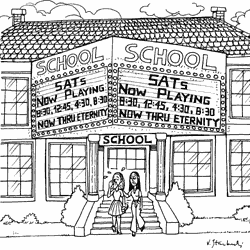
Scoring
Here is how your score is figured out. You take the number you get correct minus a fraction of the ones you get incorrect (1/4 for the reading and writing). This is your RAW SCORE. The ETS takes the raw score and translates that into a score between 200 and 800. This process involves many things but one major factor is the percentile of everyone's score that took the SAT when you did. So, you could get the exact same number of questions right two times you take the test and come out with different scores.
